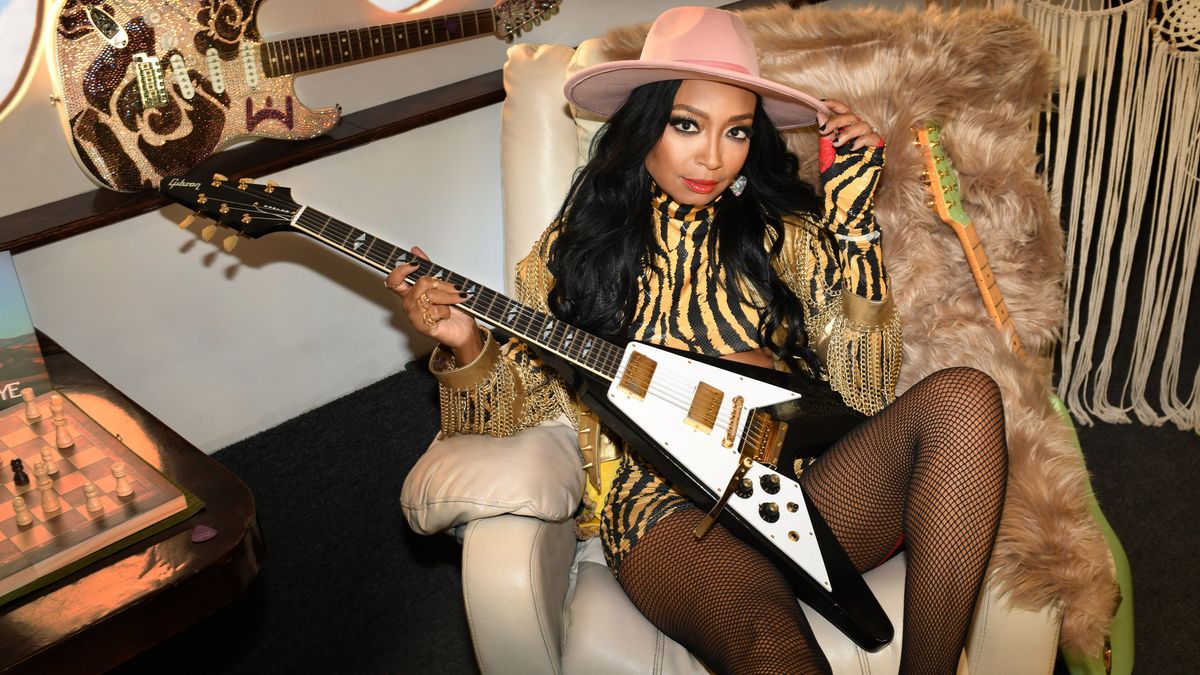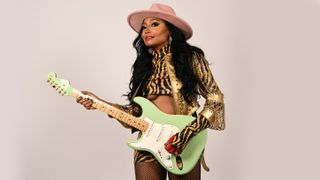"With this record, I hope that people can feel my soul and my spirit because, in those solos, that’s what I’m really giving you" – Malina Moye on her new album and the 10 that changed her life
An inspiring musician talks inspirations

There are not many guitarists on the planet who do it quite like Malina Moye. As a natural born lefty, she’s known for flipping her trademark Surf Green Stratocaster on its axis and showing the world a thing or two about how to shred it up southpaw style. But the multi-faceted artist has also spent her entire career turning all manner of other rules and expectations upside-down.
She once made history as the first African-American woman to play the US National Anthem on guitar at a professional sporting event, tore it up as the only female guitarist on the Experience Hendrix Tour back in 2012, and has played alongside luminaries like Buddy Guy, Kenny Wayne Shepherd and Eric Gales. She’s a Fender endorsee, owns her own record label and has built an astonishing catalogue of genre-defying original music.
An inspiring artist in so many respects, there are plenty of lessons to be learned from Malina Moye. So, before diving into her selection of 10 life changing albums, we made plenty of time to discuss her unique playing style, to get her take on what makes the perfect lefty guitar, and to hear all about how she packed feel into every single note on her upcoming album, Dirty.
Out now via her own WCE Records, Moye describes the new album’s concept as being “about taking the high road when people do you wrong.”
Designed to reflect the full journey an individual goes through when processing having been wronged, the track listing sweeps through a full spectrum of phases and emotions. First comes anger with You Ain’t The One, then confusion with the instrumental F.I.N.E (which stands for “F**ked Up, Insecure, Neurotic and Emotionally unstable”). Next up, Over Ur Lies reflects digging deep and finding strength, before D’yer Mak’er and Obsexxed swoop in to represent that inevitable infatuation phase. Ultimately the – and the album – culminates with the powerful soul searcher, What Do You Stand For. “I wanted to, at that point, find peace,” explains Moye.
“My goal is always to make something contemporary because this is 2023,” she adds, reflecting on her sonic mission for the project. “But I love live instruments, I love good music, I love a strong melody, and that’s what we were definitely trying to put into the record.”
For me, music doesn’t have genres. I don’t do boxes
Born into a musical family and raised in Minnesota – where it’s essentially a legal requirement to worship at the high-heels of his Royal Purpleness – Moye’s music has long drawn comparisons to that of Prince, thanks to her ability to effortlessly blend elements of rock, pop, soul and R&B into highly danceable, guitar-stuffed records. Dirty is no exception.
Get the MusicRadar Newsletter
Want all the hottest music and gear news, reviews, deals, features and more, direct to your inbox? Sign up here.
“Notes don’t know that they’re supposed to stay in this lane or this lane,” she explains. “For me, music doesn’t have genres. I don’t do boxes.”
Much like the late icon, Moye is also one of those rare breeds of guitarist who has perfected the art of bringing the magic of the instrument to a wide audience - ranging from awestruck fellow players, to many who wouldn’t normally even consider seeking out 'guitar music'.
“It’s just thinking of other ways where you can be innovative with where you can place the guitar and still listen to the story, the song and the emotion,” explains Moye, who has very deliberately balanced radio-friendly bangers like ‘Over Ur Lies’ and lead single Say My Name, with instrumental tracks and sections that allow her to showcase – not only her own considerable chops – but the full potential of the guitar as a means for expressing emotion and ideas.
From gargantuan bends to gentle little inflections, Moye is as fretboard fluent as if it were her native language. “I feel like every note is important, so it’s about the endings of each of the notes that we play because that is where the little nuances that make our signature sound are,” she explains.
“You hit something, and then it’s how you end it, your phrasing,” she adds. “You use your energy and everything and just do it.”

With right-handed players, you guys are bending the other way
From a physical perspective, her left-handedness also has an impact on things, as it influences the amount of power with which she can charge up her bends. Because the neck of her guitar is essentially upside-down - with the lighter and more bendable strings at the top - Moye’s natural bending action involves pulling the strings downwards (using a motion as if she were clenching her fist), rather than pushing upwards as most right-handed guitarists will do. The muscles of the hand are naturally much stronger when working in this direction, making full tone or larger bends more easily attainable. If you look at Albert King - a fellow upside-down style lefty - you’ll notice the very same technique in action as he performs those wickedly soulful calling card bends.
“With right-handed players, you guys are bending the other way,” demonstrates Moye. “I tried that and I couldn’t quite reach for what I was looking for. When I’d bend in the opposite direction, it worked for me. I did a lot of trial and error: I would play songs, hit the note, and then literally find every sweet spot in each one of the frets on those strings and figure out what I was trying to do.”
Crucially, she adds, “Then I’d make sure I was hitting that note right where that spot was, and feeling it.”

On Dirty, there are more examples than we could possibly list where the feeling guides the playing, but the mid-tempo groove of Courage is one of Moye’s own personal favourites. “I really tried to make the guitar solo more blues-based, but the kicker was, it wasn’t happening like that,” she recalls. “You’ve always got to serve the song and this song had more of an R&B feel.”
By resisting the urge to wail, and by channelling her inner Paul Jackson Jr (who contributed guitars to Michael Jackson’s Thriller among many other session credits), Moye found she was able to focus on “making it soulful and honouring what this music is doing, as opposed to going against it.” The result is a situationally perfect lead guitar performance, full of push-and-pull tension, tasty phrases and a gorgeous clean guitar tone.
“It also made me think of George Michael and Wham!, with Careless Whisper and those little tiny guitar licks and lines,” she adds, alluding to the track’s no holds barred commercial appeal. “I wanted the dynamics of it being soft, and then bringing it louder. I just really wanted to play in other areas and arenas that are also in my wheelhouse and bring it to this record.”

If you give me a left-handed Strat, I can’t play it. I would need to have it reversed
Seldom seen without her trademark Surf Green Fender Strat or a Gibson Flying V - as depicted on the new album’s cover - Moye follows in the footsteps of many of the great lefties who’ve come before her, in terms of her weapons of choice. Albert King rocked a Flying V, Dick Dale picked the Strat, and Jimi Hendrix, of course, played both. Asked what it is about these particular models that makes them such southpaw faves, Malina has a few theories.
“I feel that the reason that the Strat or a Strat-based guitar is always the guitar is because of the pickups and the way the bridge is,” she begins. “If I take a right-handed Strat and turn it upside down, clearly I'm going to be backwards. All the buttons and everything are going to be in the wrong place. But, what happens is, if you give me a left-handed Strat, I can’t play it. I would need to have it reversed. The nut has to be reversed for the strings, and then the bridge needs to come up and it has to move to fit the skinnier E coming closer to the top of the head. There’s one guitar that can do that, and that’s the Strat. It actually stays in tune.”
When it comes to the Flying V, it’s all about shape and access to those upper frets. “Whether it’s left-handed or right-handed, there isn’t a cutaway, so a lefty or a righty can play it and we’re going to be able to go anywhere,” she explains. Interestingly, her particular instrument is an exact replica of Hendrix’s 1969 model – and the first copy off Gibson’s production line in a very limited run of only around 50 guitars like it.
As a Fender endorsee for many years, Moye has had her Strat spec’d to meet her unique requirements, and it features a custom left-handed body to make it sit and play as ergonomically a right-handed model would for a right-handed player. “If you take a right-handed guitar and flip it, it’s uncomfortable because it’s not the right cut,” she stresses.
Each guitar is as essential as the other to Moye’s sound, and we hear Strat and Flying V tones weaving in and out of one another all throughout Dirty. “When I did ‘F.I.N.E’, I actually played through a couple times with the V, and then I also played it a couple times with the Strat,” explains Moye. “Then, on certain tracks, I took more of the V, and then I would marry it with the Strat. If you listen really closely, you’ll see that the tone varies with the different changes that come in.”

For me - and I can’t speak for all of us as women – but what I will say is that we so badly want to have conversations about our tone, our phrasing and what we’re projecting – and that’s what we’re talking about
Now, approximately two decades into her career as a guitarist, a songwriter, a singer, a business woman and many more things besides, Malina Moye has not only honed her craft to a spectacular degree, but she has witnessed - and advocated for - plenty of positive changes in the way that artists like herself are treated and perceived within the guitar world.
“I feel that we already have success on this record, and I’m going to tell you why,” she says - having, in fact, dialled in for this interview a full month ahead of Dirty’s release date.
“For me - and I can’t speak for all of us as women – but what I will say is that we so badly want to have conversations about our tone, our phrasing and what we’re projecting – and that’s what we’re talking about. For me, that’s important because that’s all I’ve ever wanted people to hear – what I’m trying to bring to the guitar, and to music, as opposed to people noticing the first things, which is obviously that I’m black and I’m a woman.”
Previously guilty of having relegated female players to embarrassingly tokenistic margins, guitar manufacturers and the guitar press have significantly upped their game in recent years to reflect the true number of extraordinary female players working today. The knock-on effect - surprise surprise - is that record numbers of women and girls are being inspired to take up the instrument. As Moye notes, it’s important to show, through representation, that the industry is a “safe space that we all can have an opportunity in.”
Having both witnessed and led the shift, Malina Moye is finally collecting the widespread acclaim that she’s owed. “I’ve always been doing this, but I’m happy that I’m being noticed and I’m happy that it’s happening at a time in my life where I’ve put years and years and years in,” she says. “Maybe now we’re really ready for people to really listen to what I’m trying to project.”
“With this record, I hope that people can feel my soul and my spirit because, in those solos, that’s what I’m really giving you,” she smiles.
Malina Moye: 10 albums that changed my life
1. Prince - Purple Rain (1984)
"The first one of these is obviously Prince, Purple Rain. Growing up in Minnesota, and with the mixture of funk, blues, rock and soul, you can’t argue with it! Everybody loves it and, married with the movie, it’s undeniable.
"Purple Rain is obviously one of the great songs, and there’s When Doves Cry – so many great records. I think every song on that album was a hit."
2. Eric Clapton - Unplugged (1992)
"I loved Eric Clapton Unplugged and the reason this is so good for me is because it was a lot of songs that we know, like Layla. It was the songs but it became unplugged and it was personal. It was stripped down and I felt like I really got a chance to hear Eric and his soul, which I loved and it changed everything.
"When I felt bad or something, I’d put this record on. It soothes you so nicely. As for Tears In Heaven, you can’t argue with it!
3. Michael Jackson - Thriller (1982)
Once again, every freaking song is a hit. Then, when you start looking at Human Nature you go, 'Of course, this is by the writers of Toto!' We’re talking about those gorgeous chords and the different changes. It’s beautiful.
Then, as we all know, when you do something like this, it just totally goes through decades, transcends generations and is undeniable.
4. Sly & The Family Stone - Stand! (1969)
"I love Sly & The Family Stone so much that when it came to Larry Graham, who is incredible, I took Larry Graham’s band, and they were my band right up until the pandemic because these guys are incredible players.
"When you want the original funk, and the original soul and feel of it, nobody could do it like them. I was just so fortunate. I was like, 'Hey you guys, can I just take you out on the road with me for a couple of tours because you’re incredible? We’re going to play my stuff and I want to bring you to a new generation, and I love you!' I learned so much.
So, I would definitely say Sly & The Family Stone’s Stand! Also, when I did my song What Do You Stand For, I was thinking about another song that Sly had, which was Don’t Call Me N****r, Whitey’. That was the whole thing. It was political, but it was just a stance. When I did What Do You Stand For’I was actually trying to take a stance from this. So, everybody can go and take a look at what I was talking about on that!
5. Janet Jackson - Rhythm Nation 1814 (1989)
"What’s incredible, again, is it’s a political situation, but when you listen to everything Janet Jackson is saying, she’s talking about the human spirit – us – how we’re going to make changes and what we’re going to do.
You start to see a lineage in how a lot of the things I like all seem to connect
"It was also about how she was reflecting and making changes in her life. Pick a song and there’s up and down emotions. Black Cat was on this one, so she showed us a rockier side of her. Jellybean [Johnson] actually wrote the record and there were great guitar players, great riffs – I mean, it’s just unbelievable.
"There’s not a bad song on this, and – by the way – they sampled Sly & The Family Stone in Rhythm Nation, which was the breakdown. So, you start to see a lineage in how a lot of the things I like all seem to connect, which is crazy."
6. The Beatles - Let It Be (1970)
"What a great album, especially my favourite song, which is Let It Be. The chord progression is very simple, but, once again, it’s the heart and soul.
"Even if you don’t like one thing on that album, you feel it. Your energy and your vibe totally gets that record. That’s why, for me, that’s one of my favourite Beatles albums.
"I think it was the album they did when they broke up, but it still came out. What a killer album!"
7. Aerosmith – Toys In The Attic (1975)
"I love Brad [Whitford]. He and I had the chance to play together on the Experience Hendrix Tour, so I would ask all kinds of questions about that album and just about Aerosmith in general.
"Think about it: [these are] some of the most iconic songs that transcend genres and generations. Just what an incredible album. I mean, they still play it on the radio today! It’s phenomenal. In fact, these are the songs that no matter where you are, they will make you go to those emotions and those places. That, to me, is what art and real music is."
8. Daryl Hall & John Oates - H2O (1982)
"These guys are just incredible, and besides that, John Oates is a very good friend. The cool thing is, in the pandemic, all these people seemed to discover my music as well.
"I’m a fan of all their stuff. There’s the commerciality of it, but the brilliance of it is keeping it commercial but still having depth, and the rhythm and the soul of the record. I love that.
"Again, you pop the record on and there’s not a bad song!"
9. Eagles - Hotel California (1976)
"All these albums have great songs. The songs all seem to come from a place where it touches me, and no matter what I’m going through, it makes me feel better, or it calms me and it makes me think about things so differently, and I love that.
"If anything, they make me want to be a better musician. They made me want to play. They made me want to do the things I’m doing because I’m like, “I want to do what you guys are doing in me for other people.”
"How lucky are we to get to witness all the talent that’s happening when you get to see this s**t? In the purest form, I think that that’s what’s so incredible."
10. Stevie Wonder – Songs In The Key Of Life (1976)
"No list for me would be complete without Mr Stevie Wonder. For me, there’s ‘Sir Duke’ and so many great records on this particular album. I also had the opportunity to play with Mr Stevie – there’s some video out there!
All this time, I had no idea that he’d heard me playing guitar
The funny story is, one day I got this phone call and my friend says, 'Malina, there’s somebody who wants to meet you.' I’m like, 'Okay, it’s 6 o’clock in the morning,' - it’s super early - 'Who wants to meet me at 6 o’clock in the morning?'
She’s like, 'Just come over. Don’t worry about what you look like.' So, I get over there and all of a sudden, I’m like, 'Oh my God, it’s Stevie Wonder!'
He had his pyjamas on and a necklace from Nelson Mandela. We were just sitting there talking – talking about music – and the kicker was that, all this time, I had no idea that he’d heard me playing guitar. I was just playing my guitar, turning it up on 10 and jamming, and he said, “You know, for a long time, I thought that was a guy playing.”
I said, 'No, it was me!' He was like, 'Man, you’re really good,' and that’s how we became friends.
- Malina Moye's new album Dirty is out now. More info at malinamoye.com
Ellie started dabbling with guitars around the age of seven, then started writing about them roughly two decades later. She has a particular fascination with alternate tunings, is forever hunting for the perfect slide for the smaller-handed guitarist, and derives a sadistic pleasure from bothering her drummer mates with a preference for “f**king wonky” time signatures.
As well as freelancing for MusicRadar, Total Guitar and GuitarWorld.com, she’s an events marketing pro and one of the Directors of a community-owned venue in Bath, UK.

"Reggae is more freeform than the blues. But more important, reggae is for everyone": Bob Marley and the Wailers' Catch a Fire, track-by-track

“Part of a beautiful American tradition”: A music theory expert explains the country roots of Beyoncé’s Texas Hold ‘Em, and why it also owes a debt to the blues










